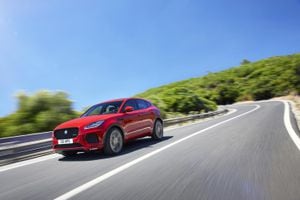Jaguar sales fall as UK car market sinks for eighth month in a row
Jaguar will be pinning its hopes on its latest 'pocket rocket' after seeing its November sales figures slide, following the downward path of the UK's new car market which shrank for the eighth month in a row.

The stylish E-Pace baby SUV – powered by two-litre Ingenium power plants made at the £1 billion Jaguar Land Rover engine factory on Wolverhampton's i54 site – has only just gone on sale but is already racking up awards.
As a result, the company should be able to look forward to some Christmas cheer for its December sales in the UK after industry figures revealed an eight per cent drop for Jaguar in November, down to 2,654 cars sold. The latest statistics from the Society of Motor Manufacturers and Traders (SMMT) show just over 163,500 new cars were registered in the UK last month, down 11.2 per cent on the same month last year.
The organisation blamed a 30.6 per cent slump in demand for diesel cars amid "ongoing anti-diesel messages from government".
As well as its new E-Pace Jaguar will be hoping for a major boost next year with the arrival of the all-electric i-Pace. Meanwhile its Land Rover sister brand was one of the few bright spots for the industry, boosting sales by 18 per cent in November to 6,241, probably due to continuing strong demand for the latest Discovery and the new Range Rover Velar – also powered by Wolverhampton Ingenium engines.
Overall, some 2.39 million new cars have been registered in the UK so far this year, a decrease of five per cent on the same period in 2016.
SMMT chief executive Mike Hawes said: "An eighth month of decline in the new car market is a major concern, with falling business and consumer confidence exacerbated by ongoing anti-diesel messages from government."
In last month's Budget, Chancellor Philip Hammond announced a tax hike on new diesel cars from April 1. Diesels will be subjected to a one-band increase in the first year vehicle excise duty (VED) rate if they do not meet tougher real world emissions standards which will become compulsory from January 2020.





